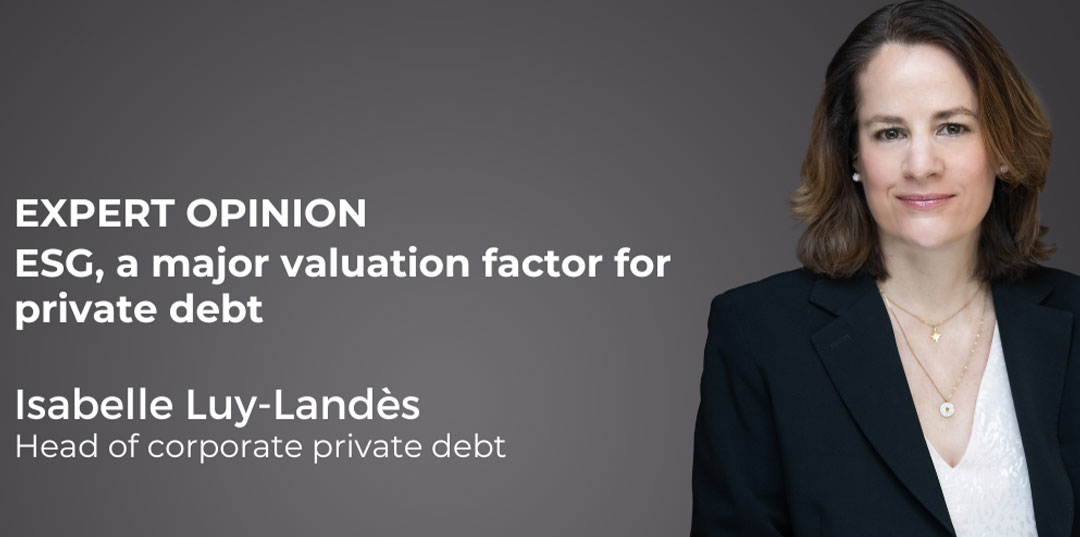ESG: a major valuation factor for private debt
12.11.2023|4 min

With interest rates and inflation stabilising at relatively high levels, the spectre of corporate defaults is resurfacing. Should we be concerned about companies’ financial health in 2024 – and, if so, rethink our private debt investment strategies? In the latest issue of Option Finance, Isabelle Luy-Landès, Head of Corporate Private Debt at LBP AM, argues for greater selectivity, particularly with regard to ESG criteria
Are default rates in Europe likely to rise in step with interest rates?
We have been operating in a high-inflation environment since 2022, driven by the energy shock and rising labour costs. To curb inflation – which reached 10% at the end of last year – the ECB raised its key rates from -0.5% to 4% between summer 2022 and today. In 2024, we expect interest rates to stabilise around 4% and inflation around 3%.
Despite these less benign market conditions, companies remain confident. They are relying on robust business models, effective cost structures and strong pricing power. The rise in default rates on bank loans in France has therefore been contained: far from a surge, we are seeing a return to pre-Covid levels – around 0.6% between 2013 and 2019, compared with roughly 0.7% today. The extremely low default rates recorded during the pandemic (around 0.2% in 2020-2021) were not so much a reflection of companies’ underlying strength, but rather the result of abundant post-Covid government support, which has now ended.
Out of caution, should investors steer clear of private debt or certain sectors?
Not at all – provided the investor is seeking to diversify their portfolio with less volatility. What is needed, however, is greater selectivity on the part of asset managers. Comprehensive due diligence must be carried out to assess all risks and model the effects of inflation and interest rate rises on each company. In addition, short-term liquidity must remain a key focus. When it comes to corporate debt, we are sector agnostic. Our priority is to invest in resilient, cash-generating companies that have proven their ability to adapt to constraints and withstand pressure over the long term – supported by experienced management teams with a successful track record during past crises.
Investors should also be reminded that corporate debt offers an illiquidity premium, benefits from declining leverage risk and widening spreads, and allows investors to capture the Euribor component. The current environment also allows for the design of more protective structures for investors. Longer transaction timelines make it possible to conduct thorough risk assessments, refine deal structuring and negotiate legal documentation in greater detail.
We are convinced that companies that fail to integrate ESG into their strategy will face increasing challenges in refinancing and will see their valuations suffer.
What role does ESG play in your analysis and ongoing monitoring?
Our Real and Private Assets platform at LBP AM – launched in 2012 – covers infrastructure, real estate, and corporate private debt. It includes 20 professionals, among them the Portfolio Management team, which works closely with the investment teams to monitor and analyse portfolio companies on a daily basis. This structure gives us a high level of responsiveness. LBP AM also has eight professionals dedicated to ESG, including one expert focused specifically on the private debt platform. ESG due diligence is conducted in the same way as financial and strategic analysis. The aim of integrating ESG criteria into company analysis and selection is first and foremost to assess long-term resilience. Weak ESG integration is an additional risk factor: we are convinced that companies that fail to integrate ESG into their strategy will face increasing challenges in refinancing and will see their valuations suffer. We engage closely with management teams, setting social and environmental targets backed by KPIs.
What role does ESG play in your analysis and ongoing monitoring?
Our LBPAM Midcap Senior Debt fund focuses on senior secured debt, targeting fast-growing French small and mid-cap companies with strong market positioning. To date, we have completed 11 investments across a range of sectors, including healthcare, industry and business services. We have a floating-rate strategy indexed to Euribor. The risk profile is moderate, with average net leverage currently well below 3.5×. One of the fund’s distinctive features is its Article 9 classification. It therefore incorporates the sustainability performance of companies, which are assigned specific social and environmental objectives when the financing is arranged and throughout the life of the transaction. Meeting – or failing to meet – these objectives results in a bonus or penalty on the credit. This demanding approach contributes to the sustainable transformation of the companies we support.
Read this interview on the Option Finance website (French Only)
